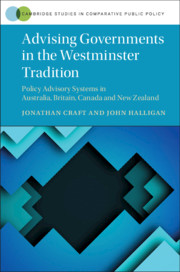 Advising Governments in the Westminster Tradition
Advising Governments in the Westminster Tradition Published online by Cambridge University Press: 18 December 2020
Chapter 5 explores the politically appointed staffs working in ministers’ and prime ministers’ offices. Comparative analysis showcases the flexibility of policy advisory systems (PAS) and the several interpretations of the Westminster tradition. Advisers were added to PAS to extend ministers’ control, address deficiencies in public service advice and increase ministers’ capacity to address the politics of policy work. Their effects have attracted debates about politicisation. At best, advisers identify political risks and help ministers avoid the derailment of policy agendas.They serve as ports of call for officials, interested stakeholders and other ministers, as well as facilitate the circulation of policy advice within government. At worst they have corrosive effects, overstepping boundaries by throwing their weight around and directing public servants without appropriate authority. They act as gatekeepers on the professional advice of the public service before it reaches ministers. There is widespread agreement that partisan advisers have become more prominent and influential. Central political offices have become adept at using them as systemic instruments to secure political alignment and coordination throughout government. Their growing numbers and the specialisation of policy functions have become important for how ministers exert political control and seek contestable policy.
To save this book to your Kindle, first ensure [email protected] is added to your Approved Personal Document E-mail List under your Personal Document Settings on the Manage Your Content and Devices page of your Amazon account. Then enter the ‘name’ part of your Kindle email address below. Find out more about saving to your Kindle.
Note you can select to save to either the @free.kindle.com or @kindle.com variations. ‘@free.kindle.com’ emails are free but can only be saved to your device when it is connected to wi-fi. ‘@kindle.com’ emails can be delivered even when you are not connected to wi-fi, but note that service fees apply.
Find out more about the Kindle Personal Document Service.
To save content items to your account, please confirm that you agree to abide by our usage policies. If this is the first time you use this feature, you will be asked to authorise Cambridge Core to connect with your account. Find out more about saving content to Dropbox.
To save content items to your account, please confirm that you agree to abide by our usage policies. If this is the first time you use this feature, you will be asked to authorise Cambridge Core to connect with your account. Find out more about saving content to Google Drive.